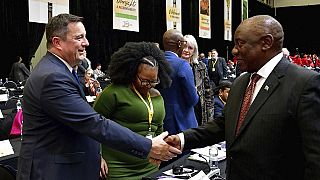South Africa
International ratings agency Moody’s has maintained South Africa’s sovereign rating at Baa2, two levels above sub-investment grade with a negative outlook.
The negative outlook on the government bond rating Moody’s said in a statement “reflects risks related to the implementation of structural reforms aimed at restoring confidence and encouraging investment, upon which Moody’s bases its expectations for a gradual growth recovery and debt stabilization in coming years.”
The agency further noted that the negative outlook “recognizes the downside risks associated with political uncertainty and low business confidence and a challenging external environment characterized by low growth, investment and trade”.
South Africa, expected to see economic growth of around 0.5 percent this year, has been trying to avert a sovereign rating downgrade to junk status which would raise borrowing costs and deter investment.
Meanwhile Fitch, another international ratings agency, has affirmed South Africa’s investment-grade credit rating at one notch above junk, reports the Reuters news agency.
The ratings agency however changed its outlook to negative from stable, warning that political risks could hurt growth.
South Africa, the continent’s most industrialized nation needs to borrow about 165 billion rand ($12 billion) this fiscal year to help plug its budget deficit but the Treasury warned this month that its borrowing costs could double or triple if it falls into sub-investment frade.
Fitch said although business confidence was depressed and investment was contracting, South Africa’s economy may have started to recover.





![Cyber Africa Forum highlights Benin's bold digital resilience [Business Africa]](https://static.euronews.com/articles/stories/09/33/14/38/320x180_cmsv2_675083a0-3d42-5b59-aba8-cbd15242e6d9-9331438.jpg)







11:15
AI drones lead breakthrough against malaria in Africa [Business Africa]
Go to video
South Africa slashes planned VAT hike after pushback from Democratic Alliance
01:10
World Trade Organization says global trade could slide this year due to tariffs
01:01
At least 14 million children worldwide risk malnutrition, warns UNICEF
Go to video
Instability hits global markets as Trump tariffs kick in
Go to video
Libya devalues currency for first time in four years amid fiscal strain